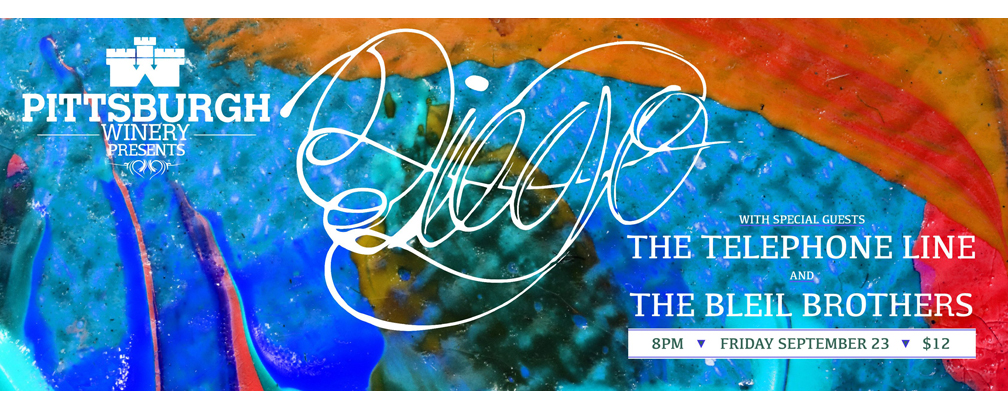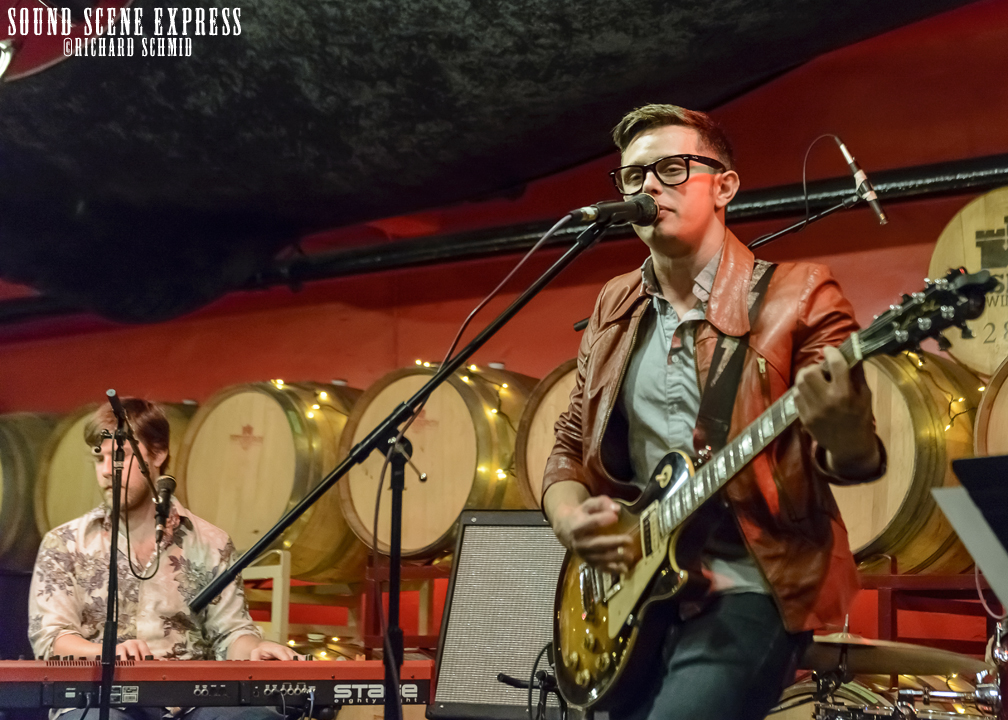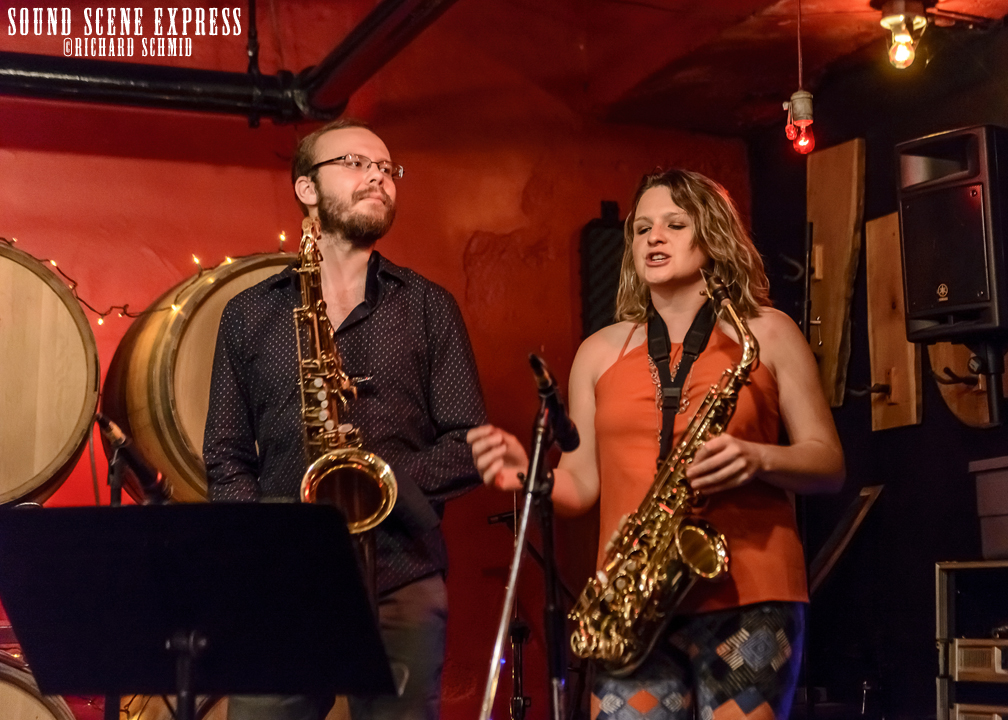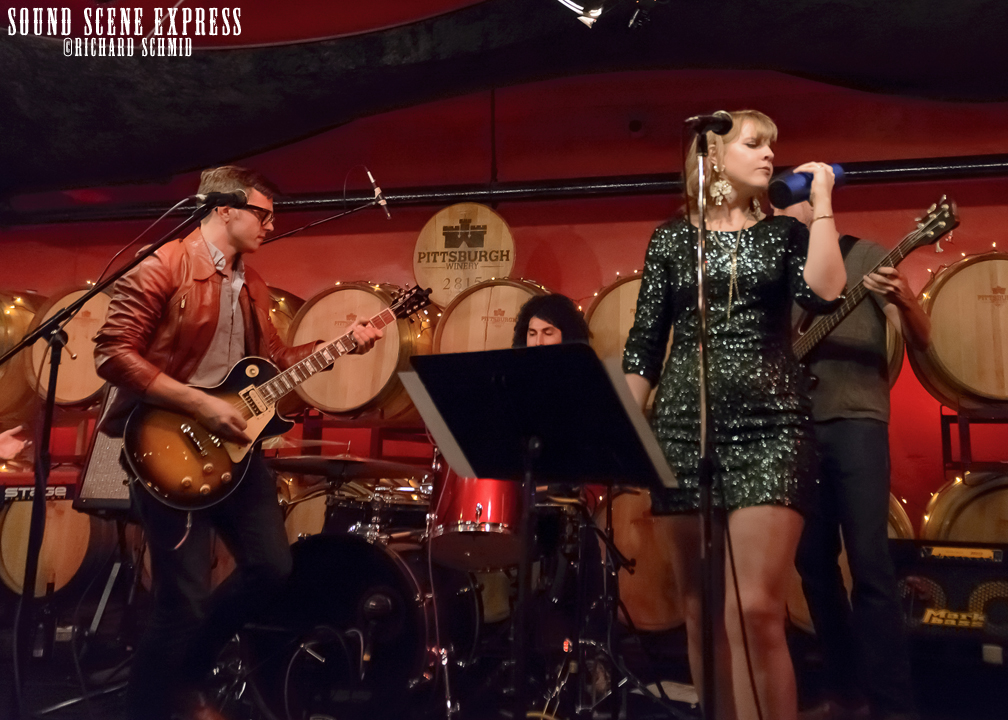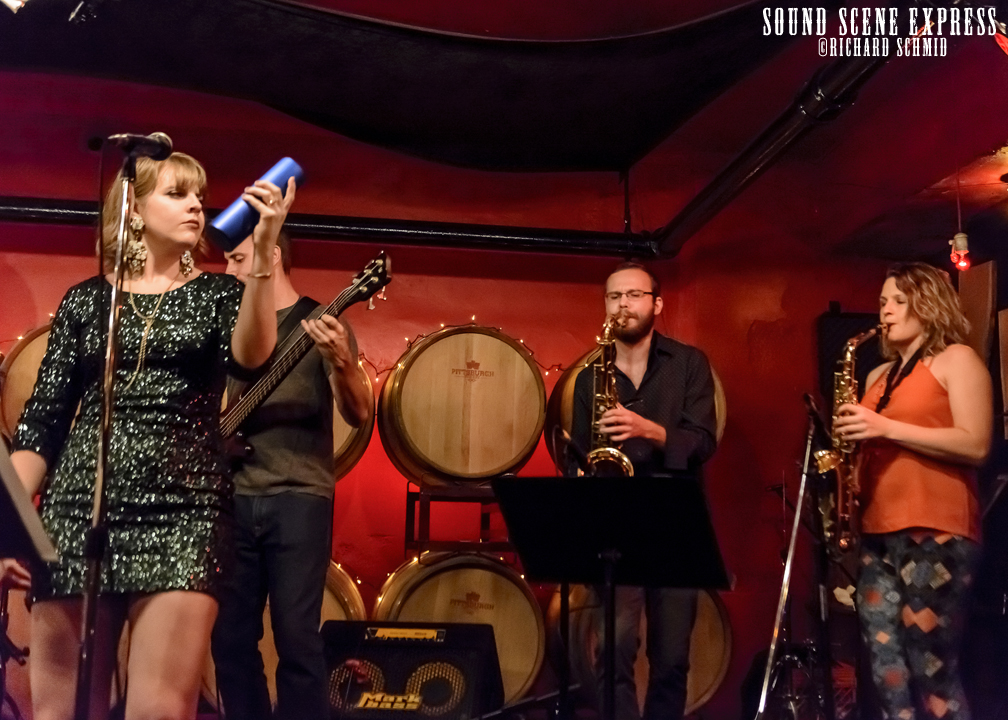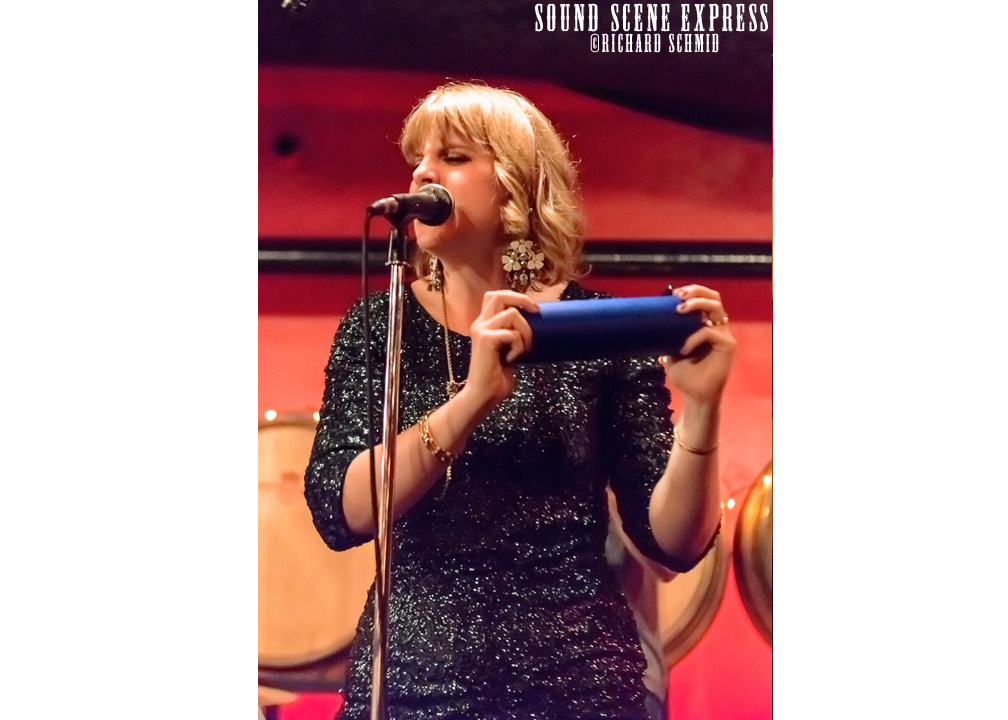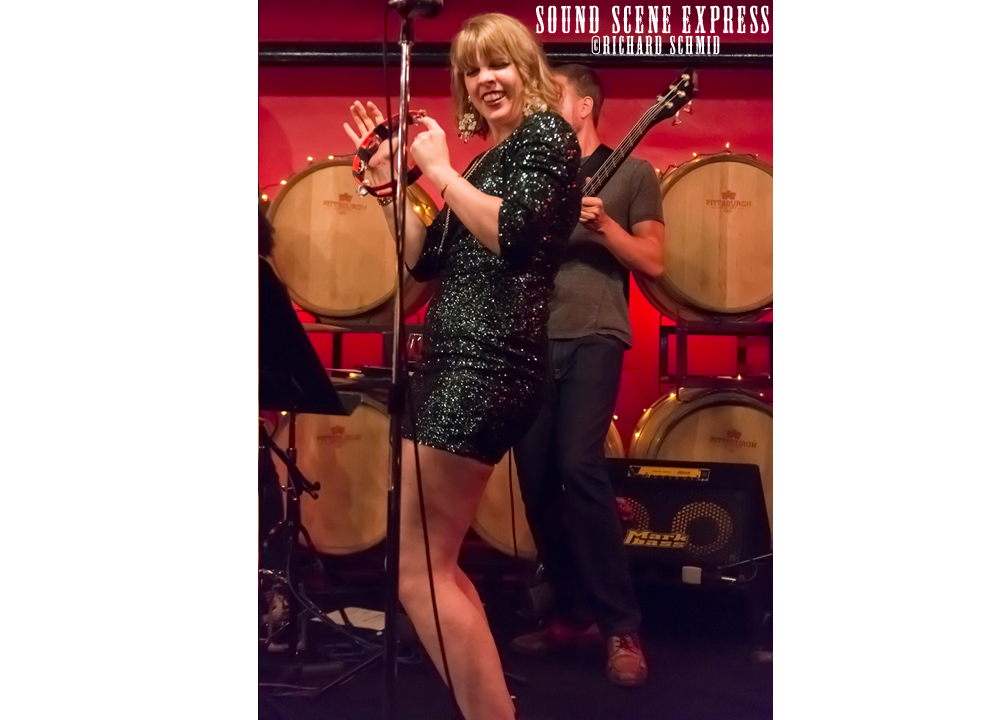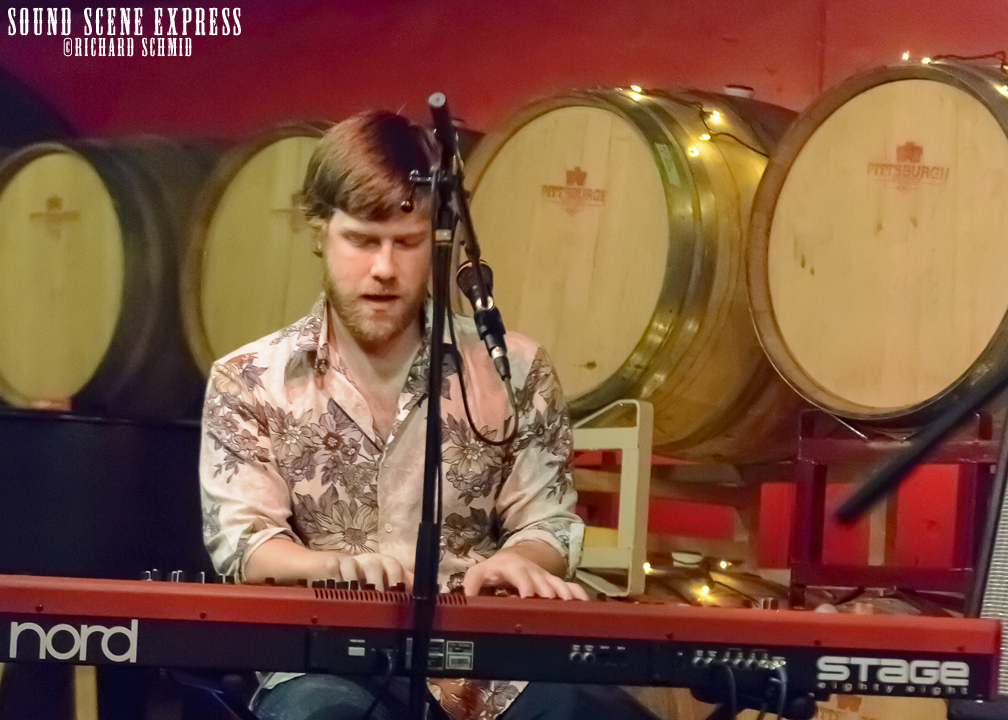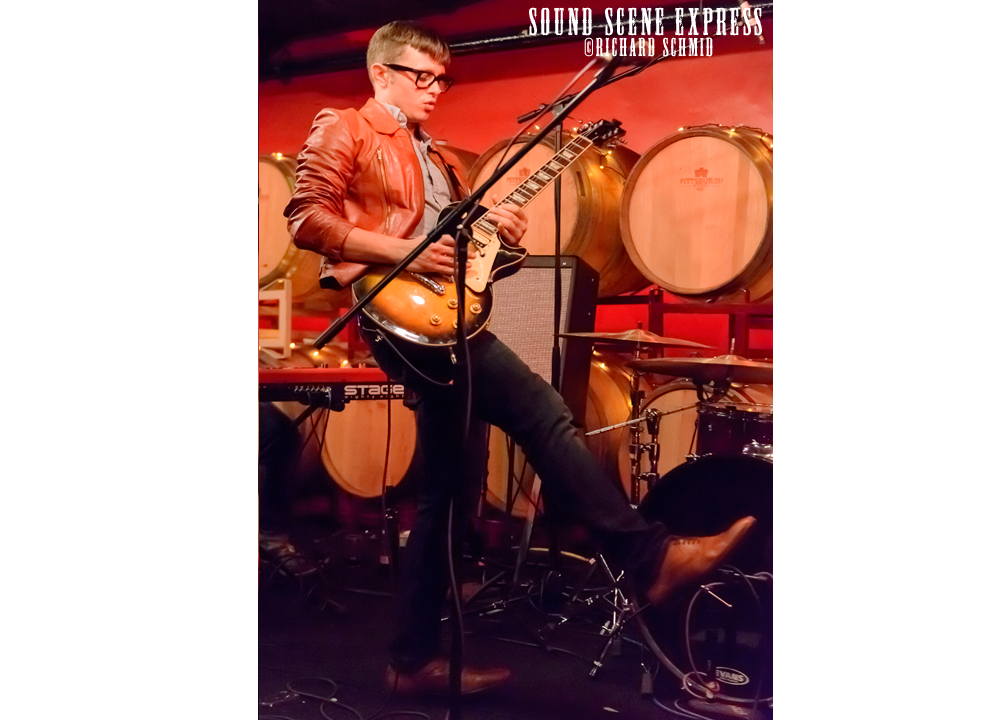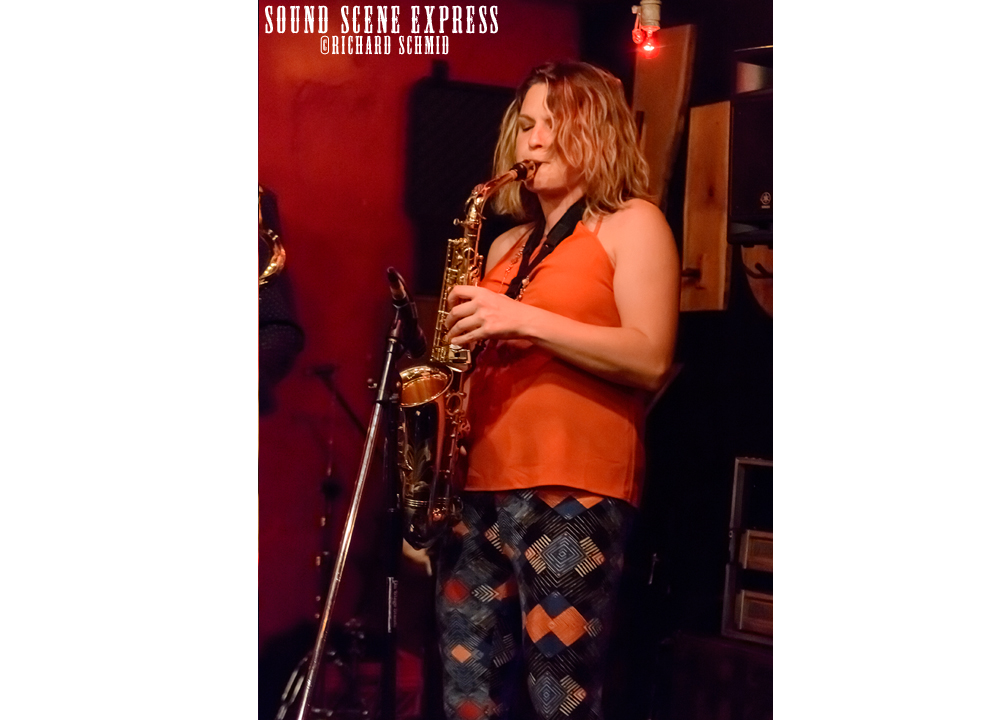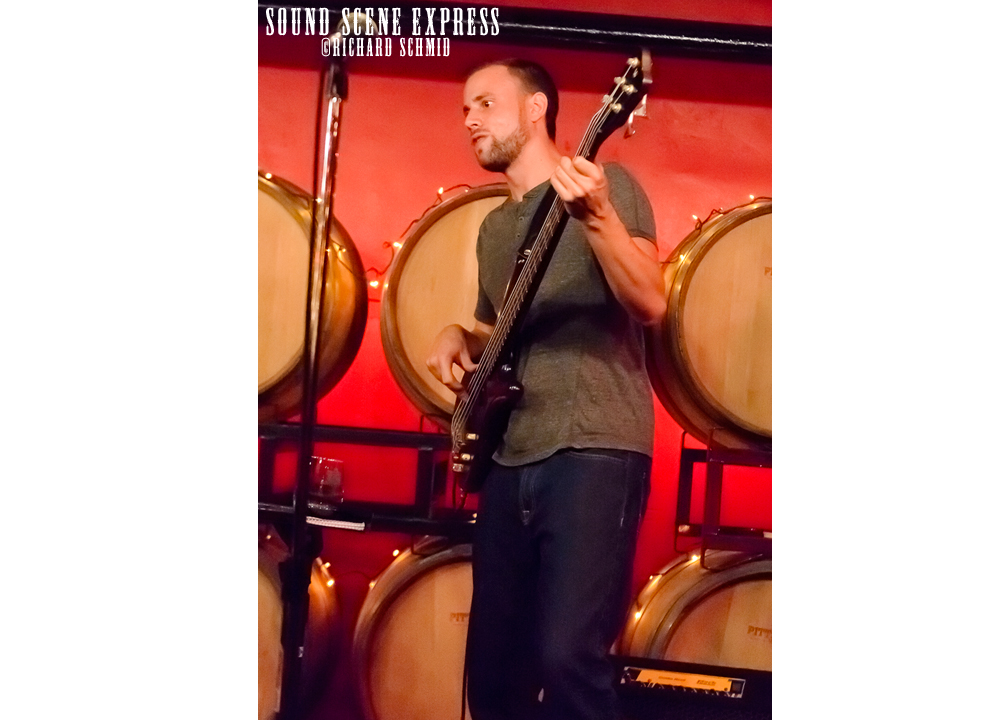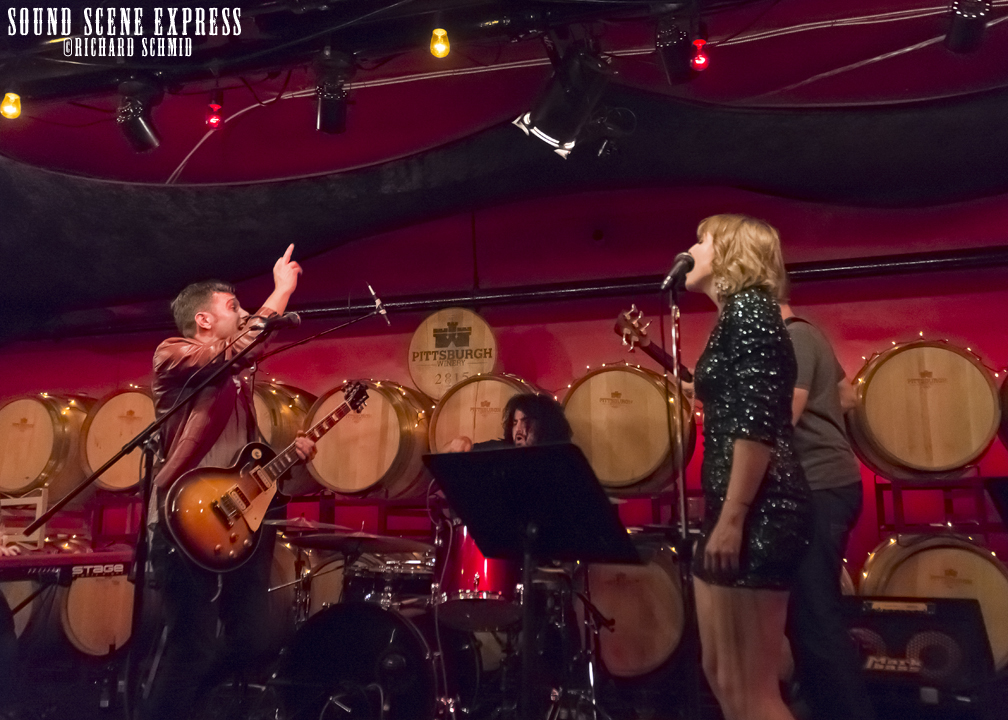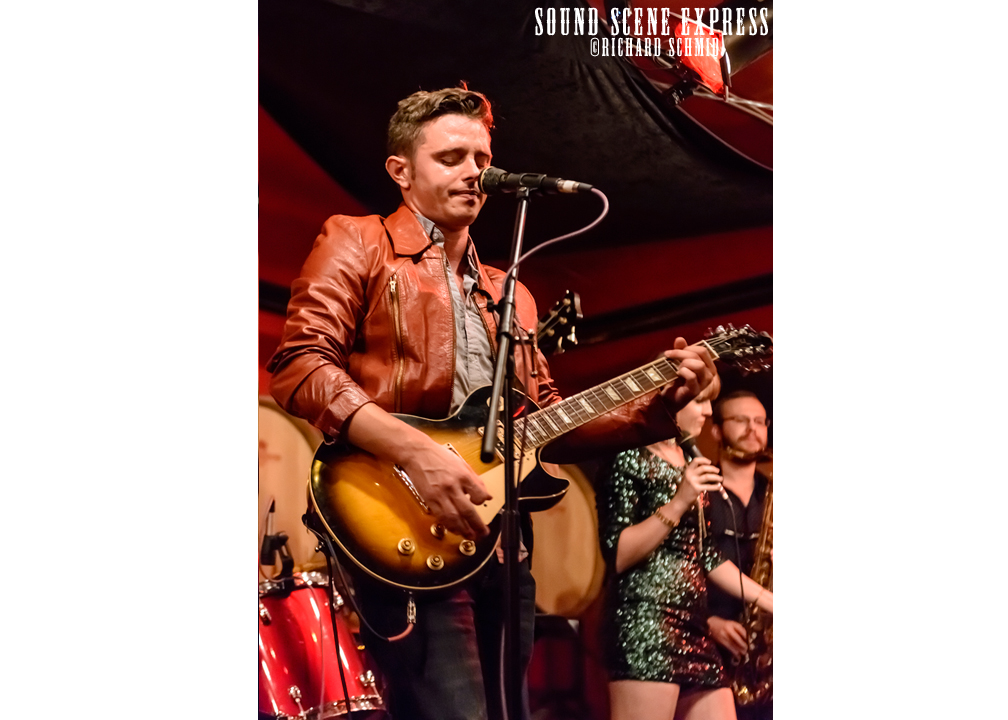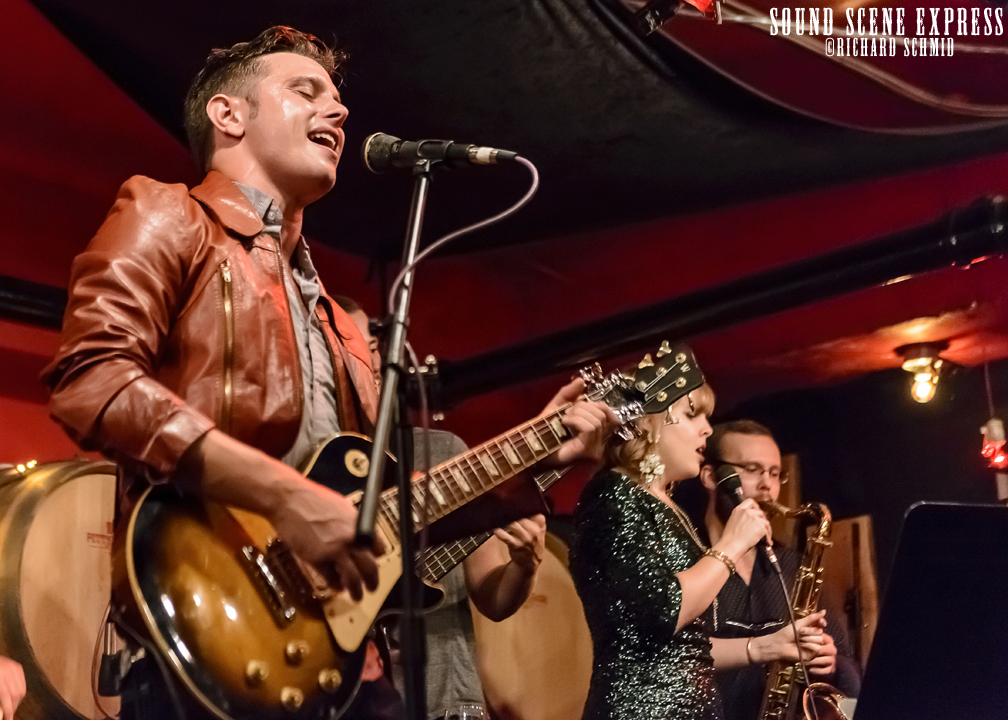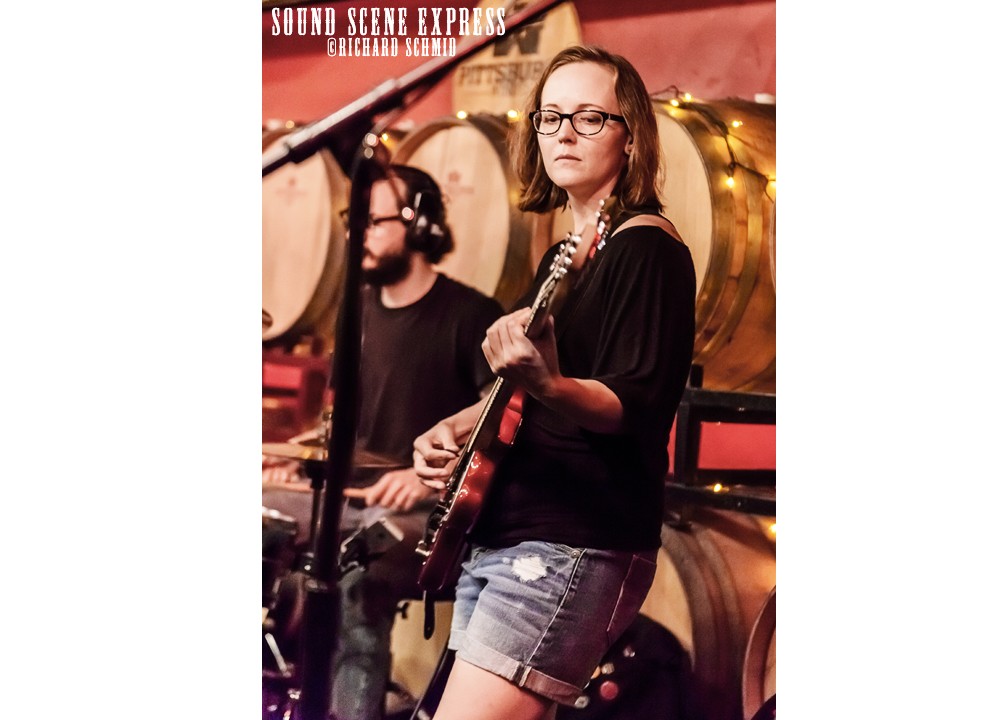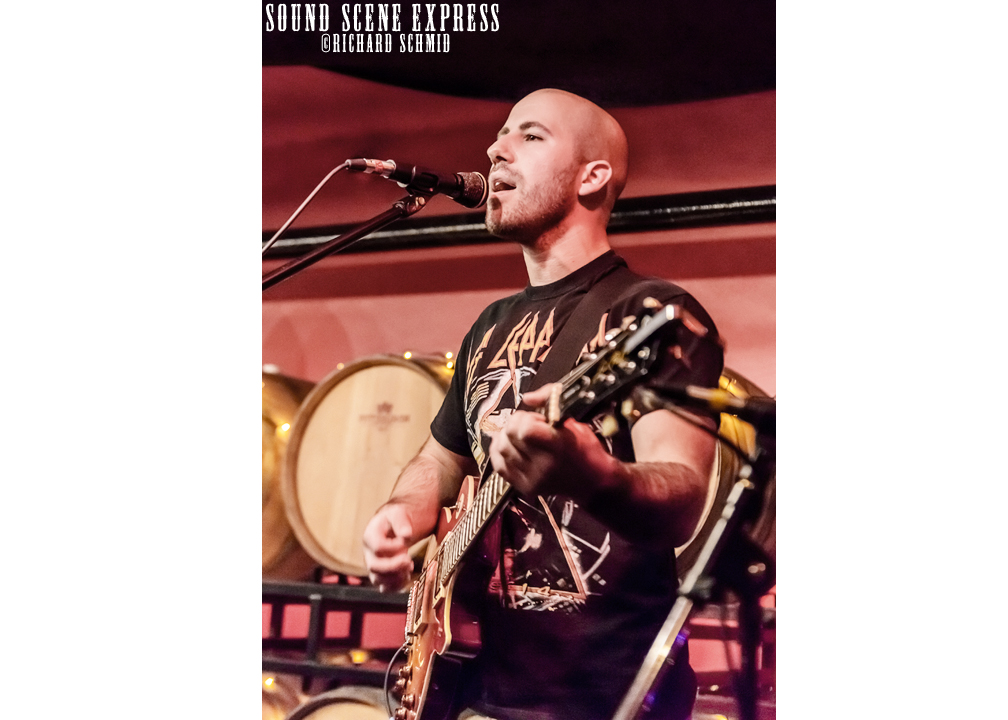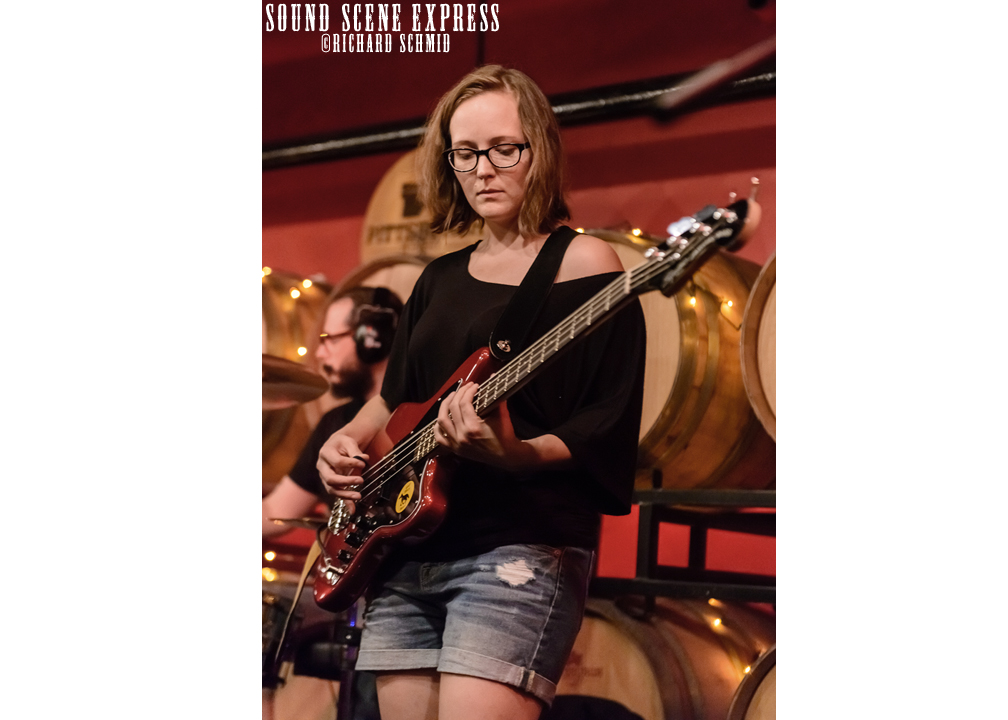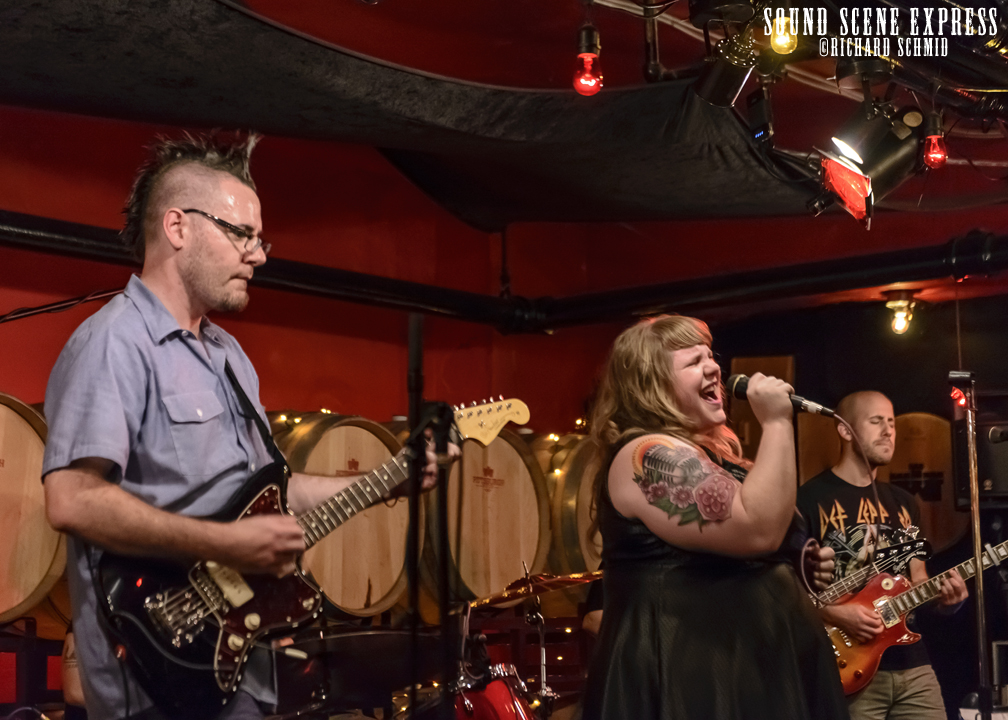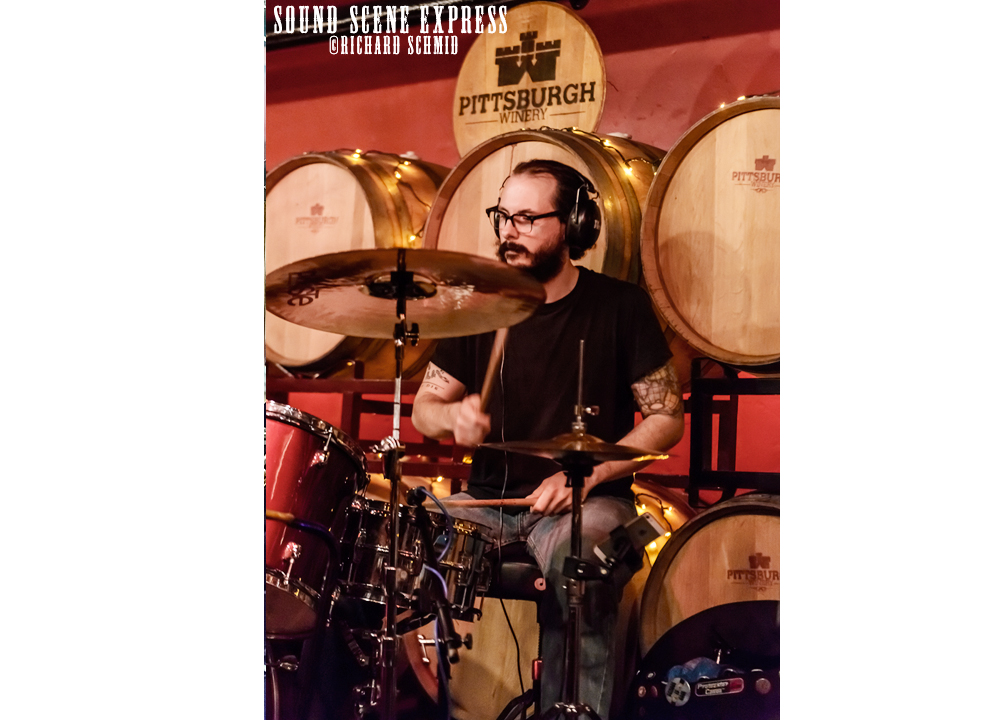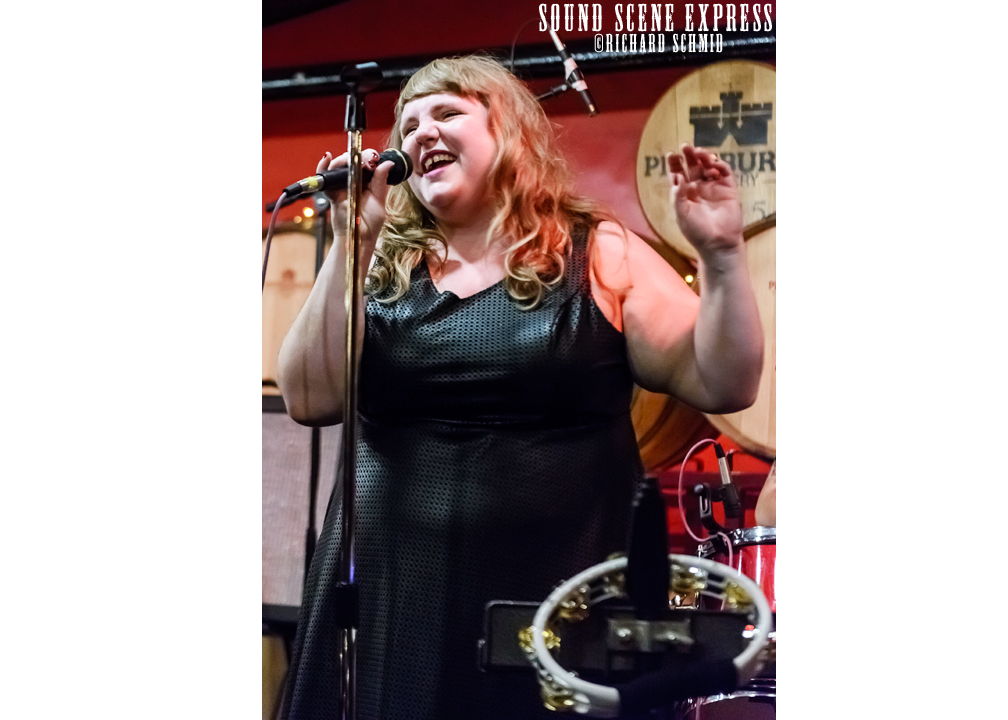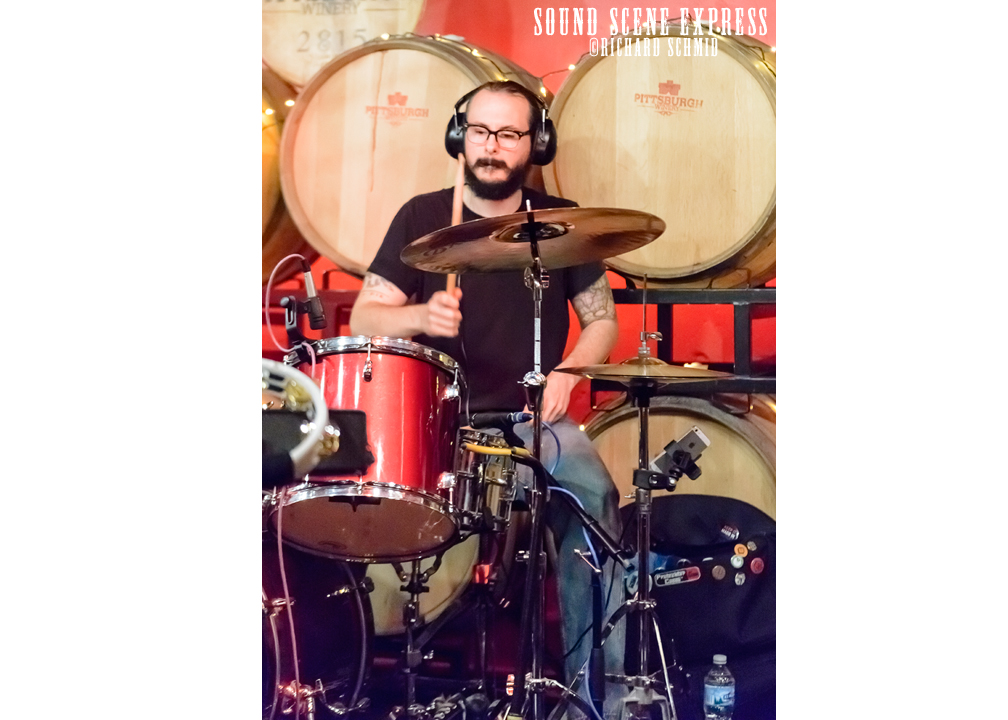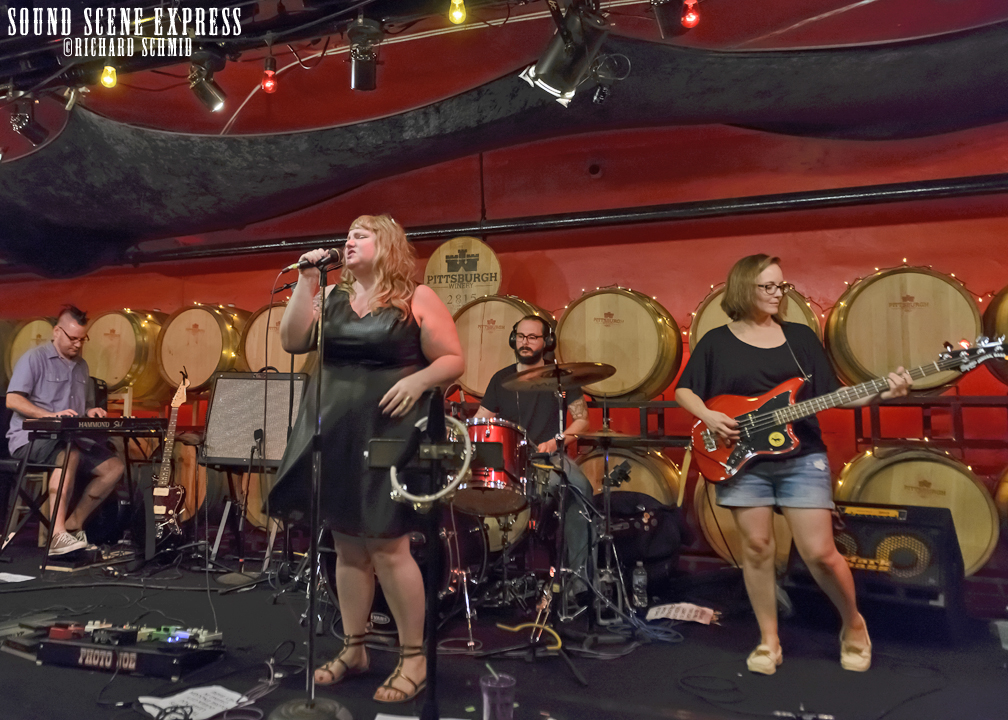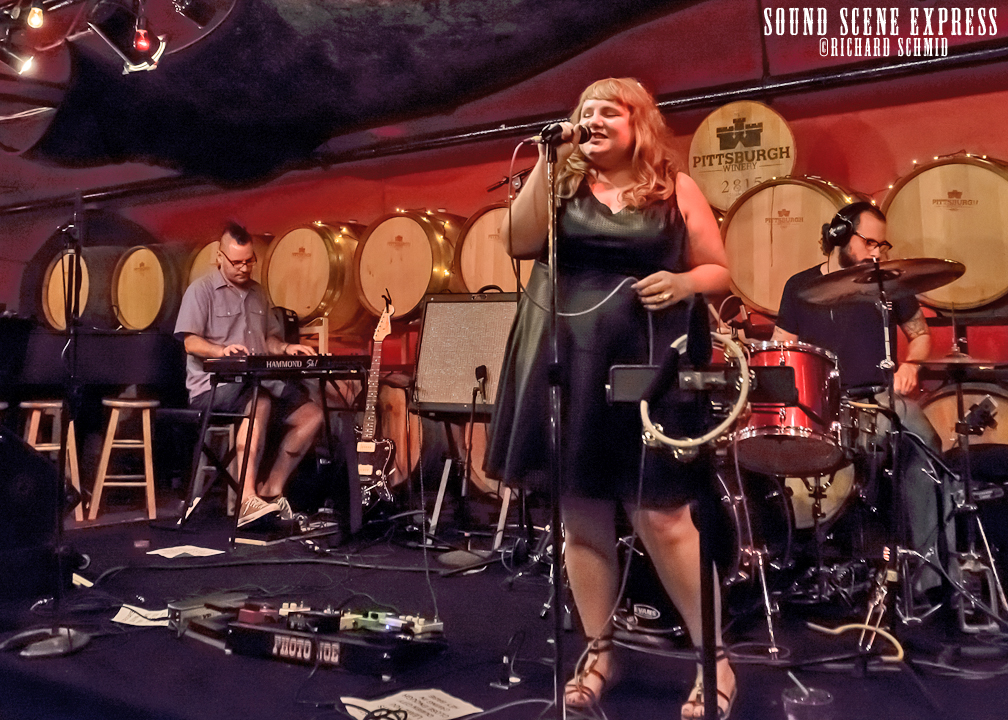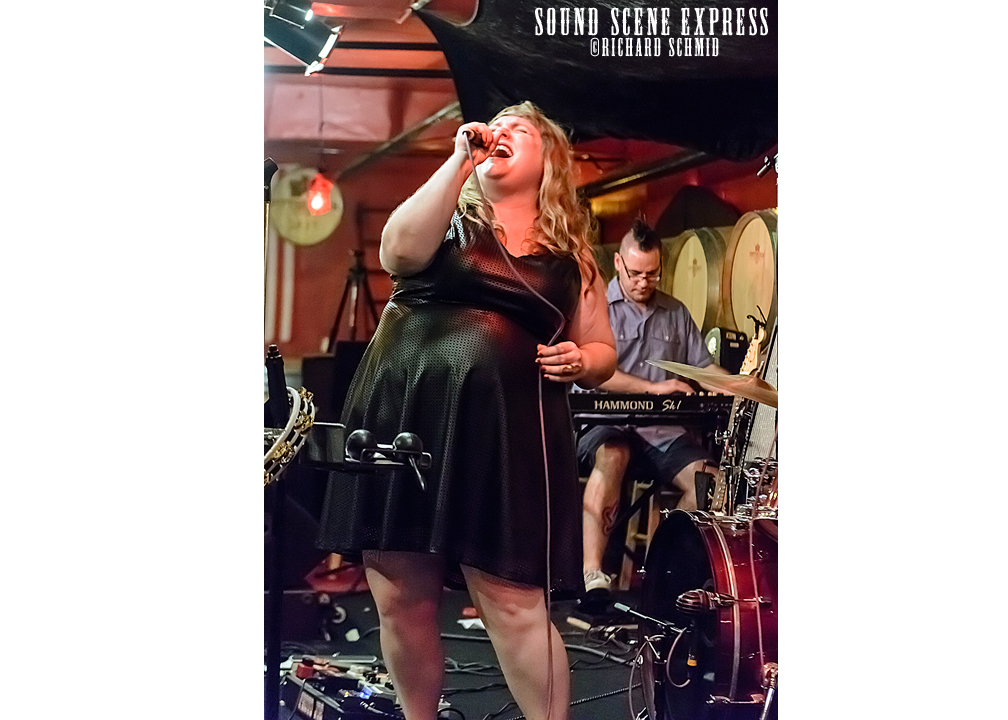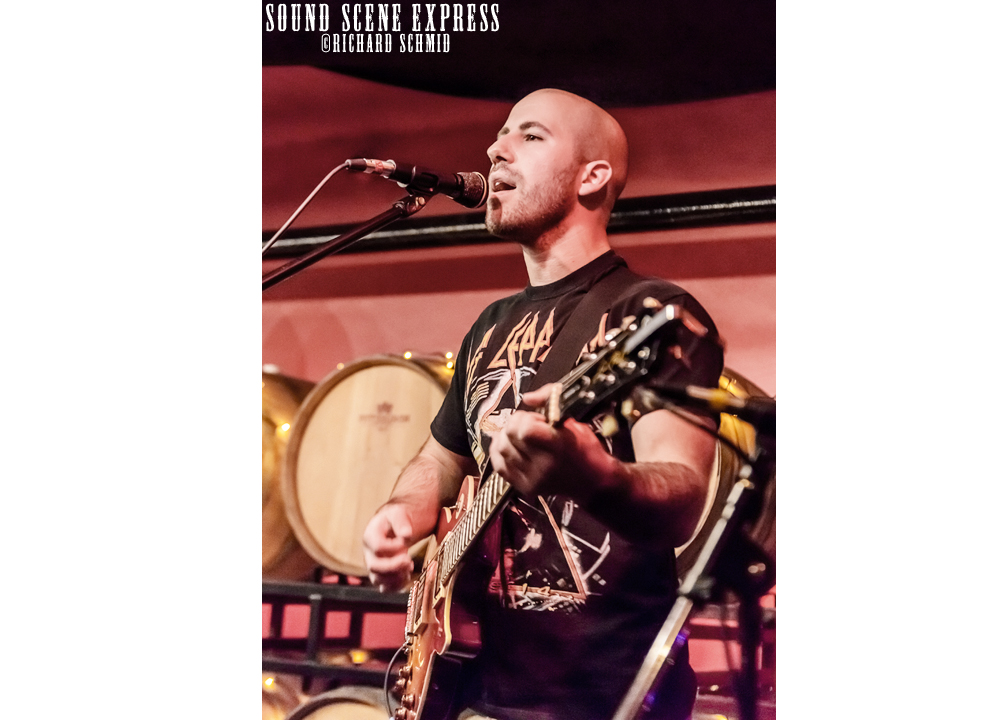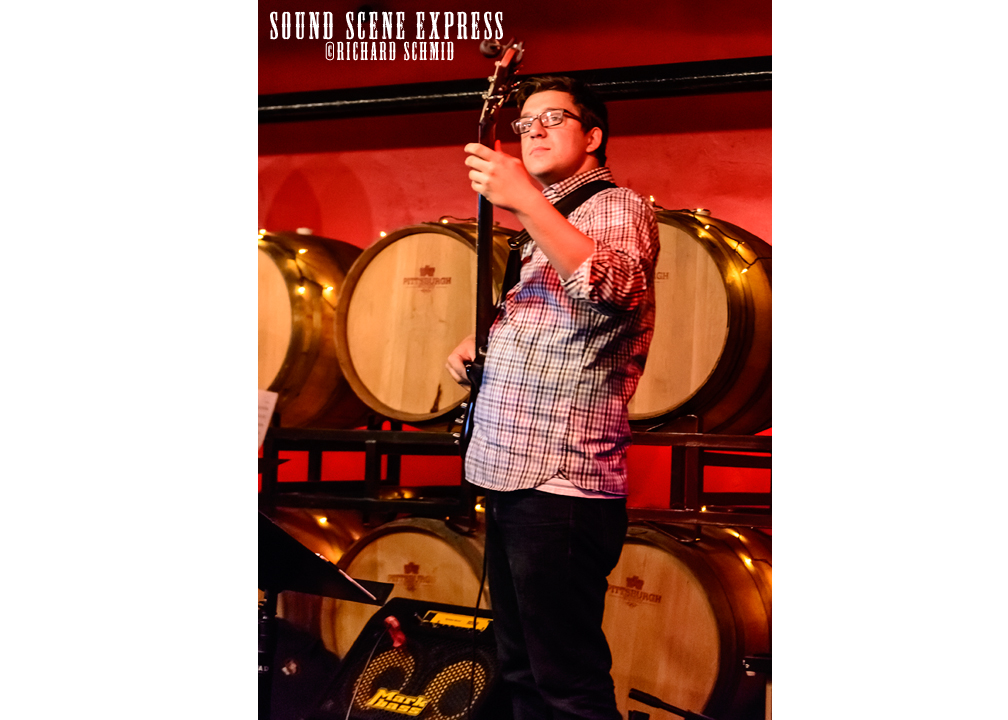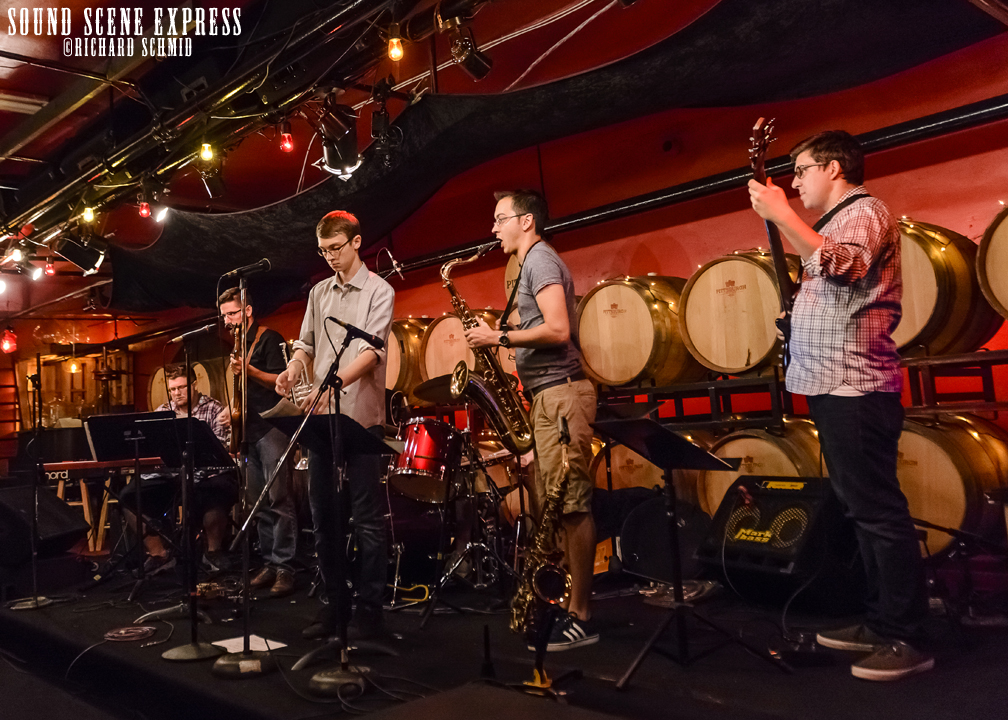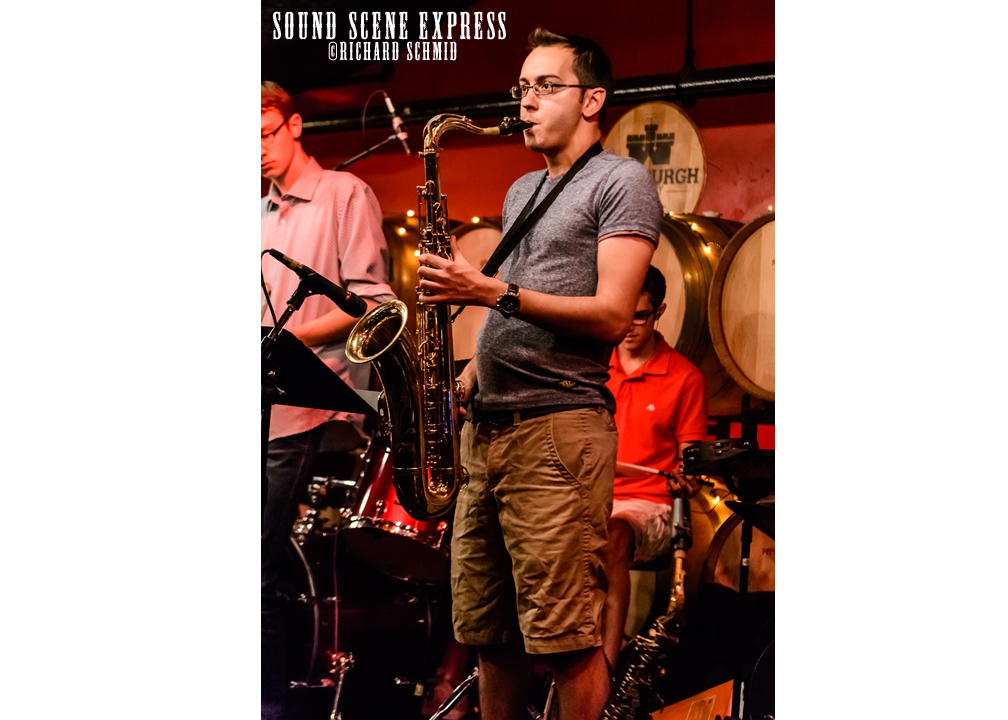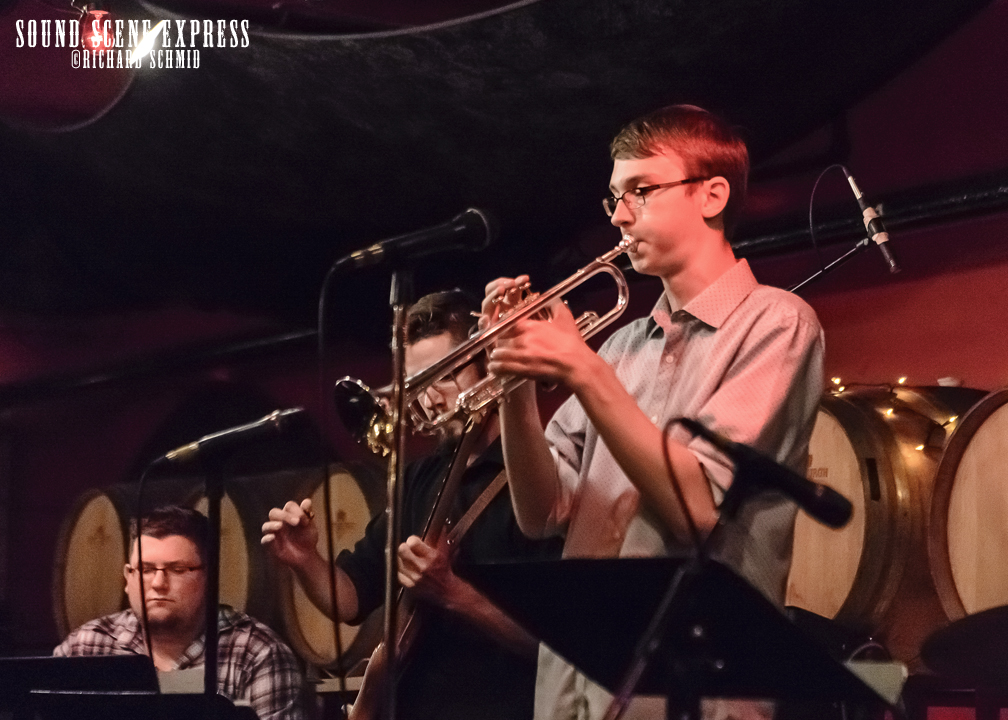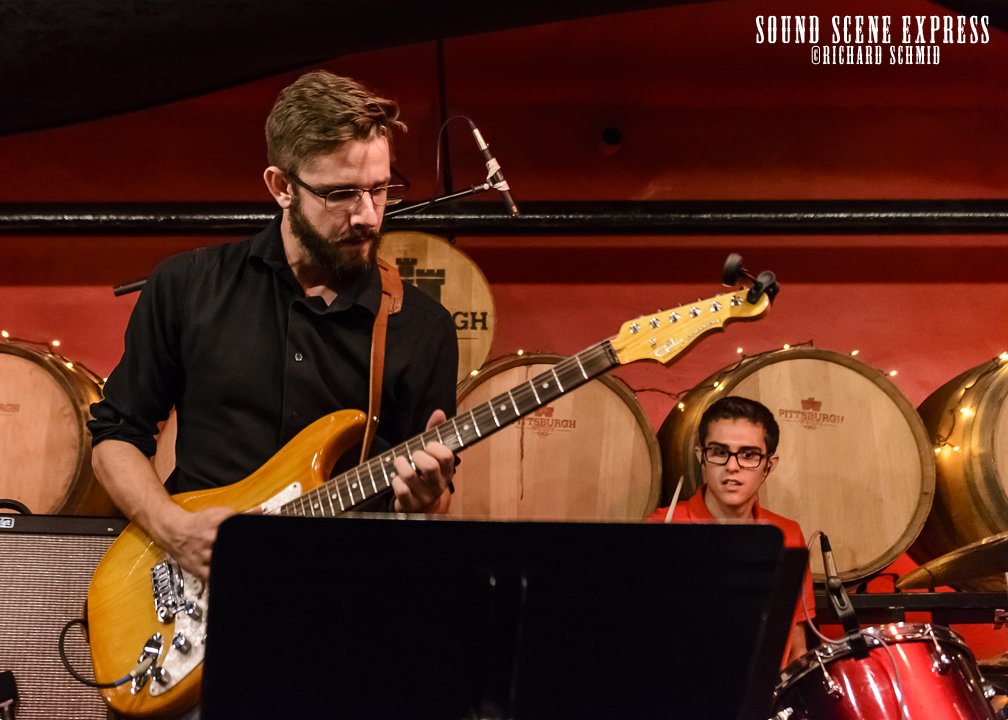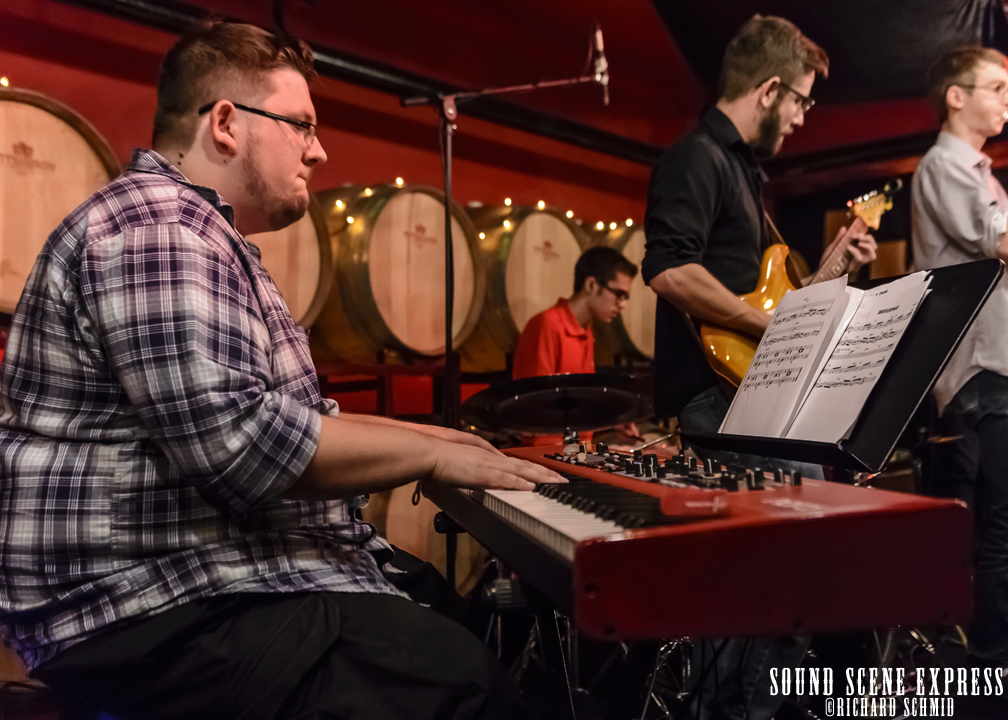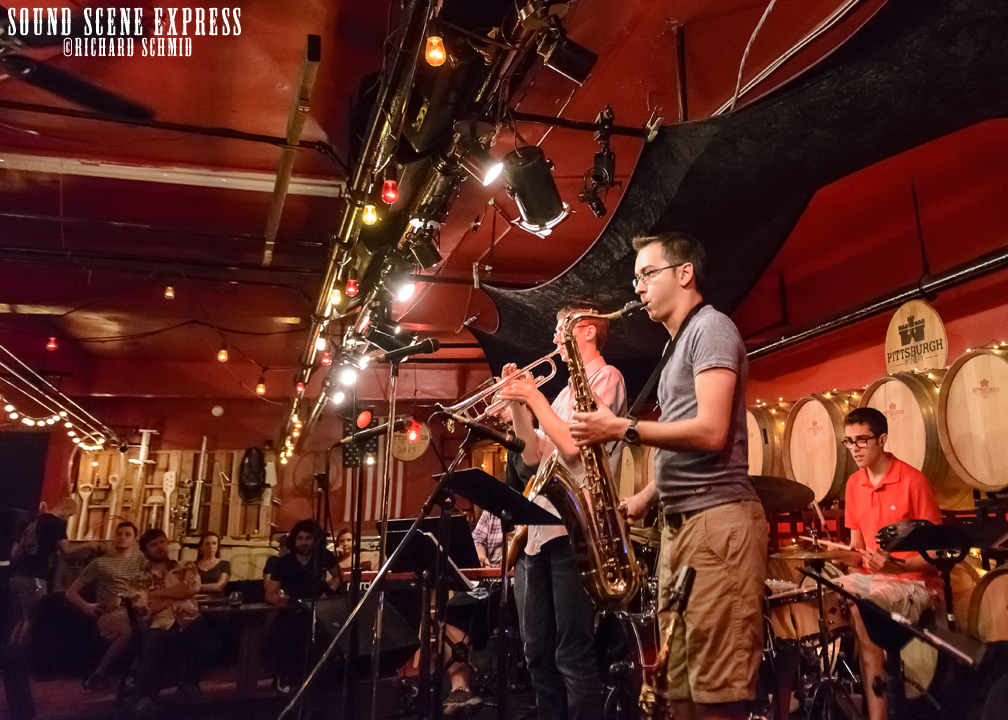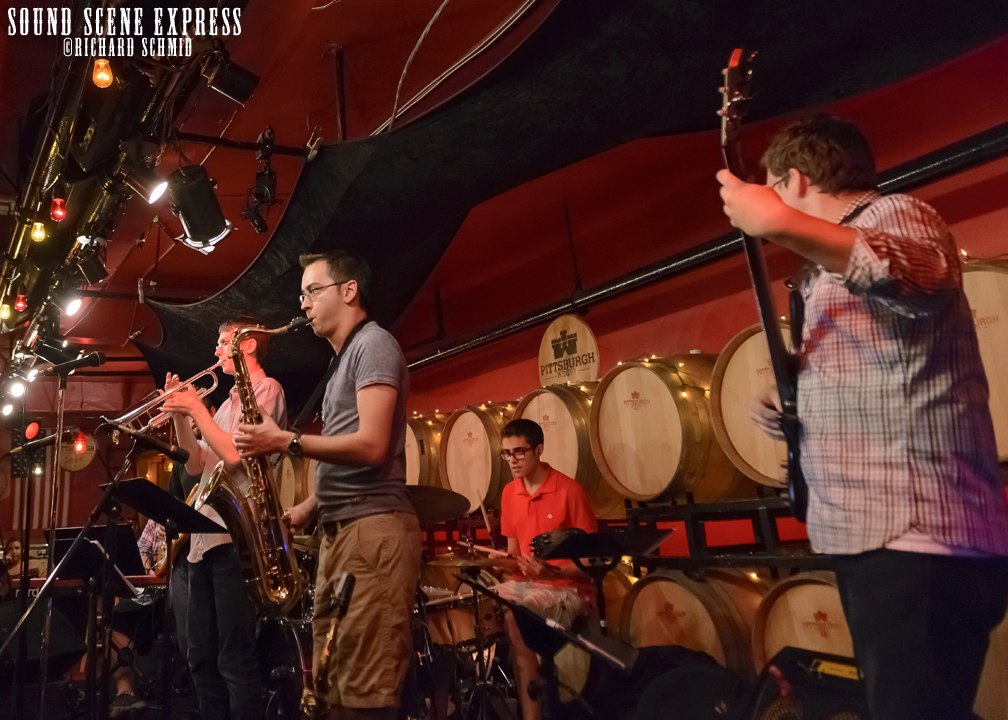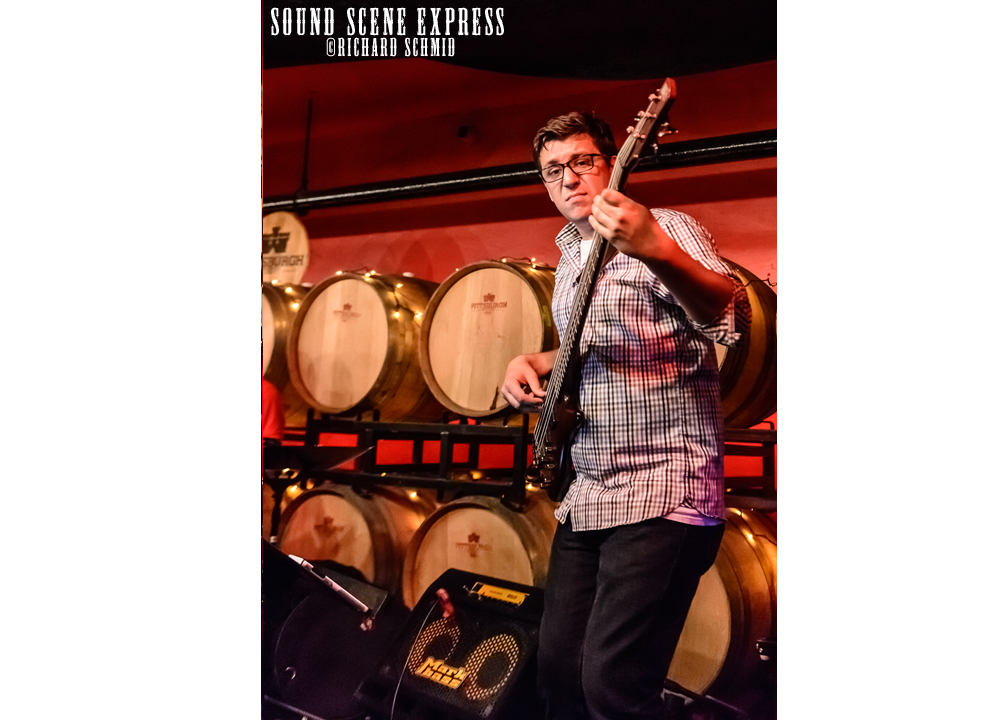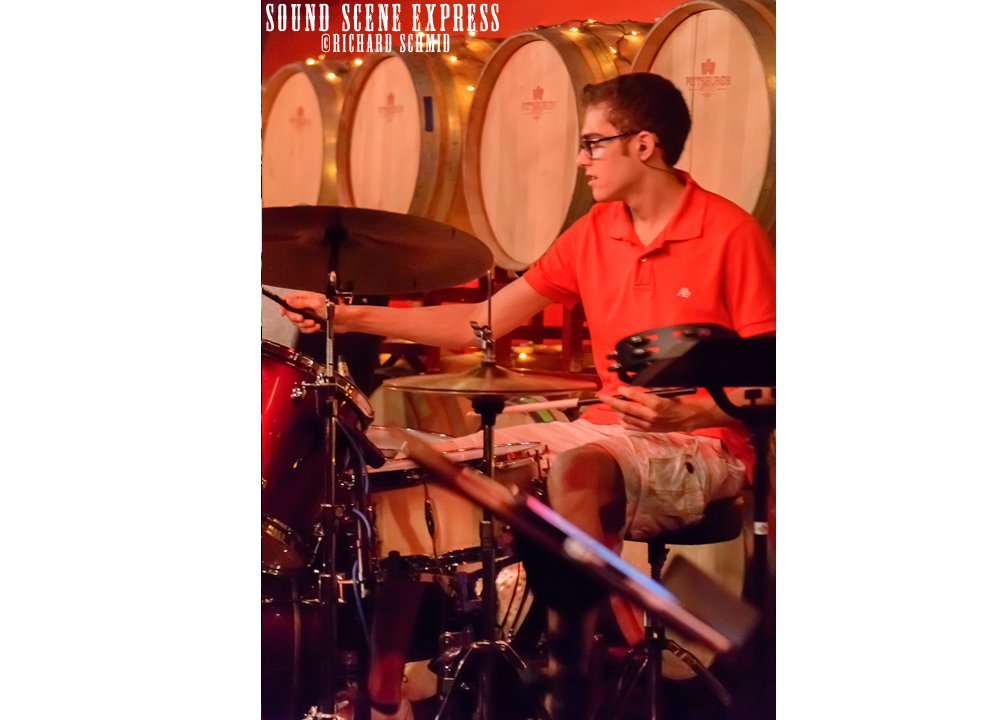Diego
w/ The Telephone Line
& The Bleil Brothers
Pittsburgh Winery
September 23, 2016
Photos by Richard Schmid
Review by Melanie Stangl
Attending a show at the warm, welcoming Pittsburgh Winery is always a treat. The red, tastefully decorated walls, the wine barrels stacked behind the stage, the candles flickering at each small table, and of course, the drinks themselves, all combine to produce a lovely atmosphere. I sipped Sangria while the buzz of conversation from the steadily filling room mixed with background music, including Amy Winehouse’s “You Know I’m No Good.” On the bill for this Friday night, September 23rd, was an eclectic mix of groups and genres—the jazzy Bleil Brothers, the soulful pop-rock of The Telephone Line, and the high-energy, catchy funk of a relatively new band, Diego—whose sounds complemented each other perfectly. Talent, heart, fun, and vitality permeated the evening, with Diego in particular proving that ‘seriously good’ doesn’t have to mean ‘serious.’
The Bleil Brothers, a young jazz sextet featuring Clint Bleil on saxophone, Adam Bleil on trumpet, Justin Thorp on drums, Nico Sleator on keys, Jon Rankin on guitar, and Mike Zech on bass, got things started with impressive instrumental prowess. The opening song, “No, Really You,” mixed loungey keys with speedy, intricate sax solos, for a vibe that was a distinctive combination of energetic and relaxed. Their sense of rhythm was on-point—they used pauses to good effect, particularly when the lead instrument would switch, and Thorp’s intricate drumming handled complex shifts with ease. These patterns held true throughout their set, as did their obvious passion. The combination captivated the audience, enough to where they would “woo!” after every solo.
The upbeat and cleverly-named “Shuffleupagus” was next, which highlighted the interplay between drum and bass, then slowly eased up into a swoony outro on the keys. Before they moved into the third song, they announced (to enthusiastic cheers) that they recently finished recording their first album. The release show, fittingly, will take place at James Street Gastropub and Speakeasy sometime in December; keep your eye out for that.
The smooth flow of “Drivin’” proved that complexity can still be relaxing, while “Hursky” brought the energy back up. Clint switched to the smaller of his two saxes for this one, enabling strong brass sections where he and Adam played in unison. Rankin also got a chance to shine with an impressive guitar solo, and Thorp’s drumming prompted me to write down a single word in my notes: “DAMN.” This song in particular showed the band’s keen instinct for layering to produce great live jazz—it manages to be intricate without getting you lost. Their final song, “Big Ball of Cheese,” was another unexpected combination: rollicking yet smooth, like a nighttime drive through a city. Zech’s bass, the heartbeat of the set, took a solo, and the grand celebratory energy at the end was a fitting conclusion. In more ways than one: it happened to be the guitarist’s birthday. His bandmates presented him with a sash and prompted the whole crowd to sing to him while the groups started switching out.
The Telephone Line took the stage next, with lead singer Addi Twigg joking that “the rest of the set will just be Bleil Brothers songs…and I’m gonna scat the horn parts.” She was joined by bandmates Jay Crivanek on guitar, Joseph Gustafson, who alternated between guitar and keys, Lacey Volk on bass, and Brad Crouse on drums. The two backup singers who occasionally join the band were absent, giving Twigg’s staggeringly strong, soulful, and all-around incredible voice an opportunity to stand alone (with intermittent harmonies from Crivanek.) The midtempo, happy “Golden Days” got things off to a good start, while “So Fine” provided a more contemplative groove. Twigg sang lower in her range, and the guitar sound grew more distorted. Both songs had key changes which were navigated expertly: despite their pop sensibilities, this band goes to melodically unique places.
“Tiny Lights” slowed it down even more, a perfect soundtrack to a pretty candlelit evening, which suited the Winery’s ambience particularly well. This song, along with several other tunes on the setlist, appears on the band’s debut full-length record, Tied Up, which was released last November. “Leave You Wanting More” was next, a sultry song with a swell of organ-esque keys at the beginning leading to an appealingly prominent bassline throughout. Twigg tackled her higher range here, which shone especially well in the bridge, with staggering vocal gymnastics that grew in both emotion and intensity throughout. This song completely filled the space, and proved Twigg more than worthy of the word ‘powerhouse.’
“Queen of the City” was a sassy, head-nodding number, which repeatedly asked, “Did you get what you wanted?/Did you ever think of asking for it?” Twigg took the time to thank both the Winery and its sound technician before moving into the gorgeous “Close Enough.” Its lilting, midtempo instrumentals, combined with tender, pleading vocals, showed the band’s doo-wop and classic soul influences, to great effect. Aware of its balladeer tendencies, Twigg then quipped, “We’re gonna actually do something upbeat for a change.” “Caving In” expertly combined a bass solo from Volk at the beginning with funky guitar parts, dreamy keys, and strong vocals that promised to “fight for you, yeah.”
With one song left to go, Twigg thanked the upcoming headliner, promising the crowd “He’s a dreamboat…you’re gonna love him.” “Hey Babe” displayed the band’s rock chops, the jamming back-and-forth guitar parts vaguely recalling “Paris (Ooh La La)” by Grace Potter and the Nocturnals. The fun the band was having onstage spread the party atmosphere out into the audience, who couldn’t help but at least nod their heads to the confident, infectious beat and such lyrics as, “Hey babe, I got a criminal mind/Sharp as a razor, black as the night.” Aside from being a great, powerful closer, this song showed one of The Telephone Line’s key strengths: the sincerity and intention they bring to their music. The enthusiastic cheers that followed Twigg’s final “good night” proved that this heart was appreciated.
Bottles were steadily emptied and glasses refilled as the last act of the night prepared to play. The background music was an interesting mix, including Bastille’s “Pompeii” and Tears for Fears’ “Everybody Wants to Rule the World.” This turned out to be fitting: Diego’s set offered a lively blend of covers and originals that drew from various genres. The band (consisting of Diego Byrnes on lead vocals and guitar, Chris Skelly on bass, Rich Kawood on drums, Abby Gross and Collin Binko on saxophone, Bronwyn Higgins on backup vocals, and Max Somerville of Wreck Loose on keys) is relatively new to the scene, with their debut self-titled released only a few months ago, on June 10th. They made this varied set work with not only solid musicianship, but incredible energy and a seemingly singular goal: to make sure everyone else was having as much fun as they were. From where I was sitting, it was pretty hard not to.
Byrnes (who sported a too-cool-not-to-mention leather jacket) introduced original opening track “The Best” with a rallying “HOW’S EVERYBODY DOIN’ TONIGHT??!” Encouraging lyrics and rollicking guitar accompanied hand claps and the “shika shika” of a maraca, for an undeniably upbeat start. This tune could literally be the “everything’s happy now” montage soundtrack in an 80’s movie. Gross’ and Bad’s saxes dominated the bridge, cementing the band’s trademark pop-funk fusion style. They carried that into a rowdy cover of James Brown’s “I Feel Good,” which Byrnes prefaced with a question to the crowd: “Who’s feeling good?!?” He asked it again to garner more “Wooo’s,” before the whole group started together, seamlessly. His enthusiasm shone in funky footwork and a voice that balanced strength, precision, and passion. It’d be hard to imagine a better cover for this band, and the cheers that were respectable before erupted both during and after the song.
Another original, “When I Wake Up In The Morning,” was next, a slower number that didn’t skimp on soul or positive vibes with cheery organ keys, a distorted guitar solo, and the call-and-response repetition of the title phrase, in which Byrnes got the crowd to participate during the bridge. Ever the gracious host, he implored, “Give it up one more time for The Bleil Brothers and The Telephone Line!” before moving on to “Things We Are.” This song started with a chill, tropical vibe thanks to subdued drums, swoony keys, and lyrics such as “And if I was a grey whale/You’d be my ocean blue/I could swim in you forever/And never find the end of you.” It picked up both instruments and energy level nearly every few phrases, travelling and building to a full-band jam in its short two-minute run. The group showed its range without losing steam, and had the crowd hooked (thanks in no small part to Byrnes’ skill as a frontman.)
“You Gotta Know” was a highlight of the set for its utter uniqueness and complete confidence. It offered a dazzling, unexpected combination of surf-rock bass lines, jazzy brass parts, two separate shredding guitar solos, and a recurring assertive grittiness in the vocals. It was high-energy, but with an unprecedented—and extremely appealing—edge.
Before a fun, rousing rendition of Jimi Hendrix’s “Fire,” Byrnes announced, “Max Somerville killin’ it on keys!” to the crowd’s vocal approval. Somerville replied in kind: “Diego’s my MAAAAN! He’s my MAAAN! He’s my MAAAN!!” The saxes ended up right at home in the Hendrix tune, whose energy was truly staggering. Not even a dropped pick could stall Byrnes for long (thanks largely to Higgins retrieving it before the guitar solo), and it couldn’t be clearer how much everyone was enjoying themselves. The slower, swanky original power ballad “New Victorian” was next. It gave Byrnes a chance to go higher in his range while crooning emotional lyrics like “When I kiss you, I am free,” and the repeated brass riffs proved a strong accompaniment.
Two songs remained, and Diego ended the set on just as strong and energetic a note as where they started. “Love” is a powerful, funky jam with a great sense of rhythm, and Higgins’ voice was impressive in its high, well-controlled, held-out harmonies over Byrnes’ belting of the title word. You can watch the music video for that here; it features stunning, colorful animation of Byrnes’ original paintings. The joyous, midtempo “Don’t Fight the Feeling” brought it all home in the best way. It’s only fitting that an ode to letting loose (“So do yourself a favor girl, and set your body free”) be completely danceable, and this WAS. Kawood, Defade, and Gross all got a riff to show off in the jammed-out, extended bridge, and when they all played and vibed together, you really COULDN’T fight the feeling. (But don’t just take my word for it: check it out for yourself in this live video of the show’s finale.)
What made these three bands fit so perfectly together on the bill was not only their varied jazz and funk sensibilities, and their inspiring skill, but something a little deeper, too: genuine heart, passion, and enjoyment in what they do. Every group on that stage had a great time (perhaps none more so than Byrnes and his compatriots), and the crowd adored them for it. I couldn’t imagine leaving the Winery basement in anything but an incredible mood, even as the Sangria wore off and cool early-autumn breezes replaced the warm, candlelit, music-laced space.
Diego’s next show is on Friday, November 4th at James Street; here’s the Facebook event page. You can also follow Diego here, The Telephone Line here, and the Bleil Brothers here.
Diego
The Telephone Line
Bleil Brothers

